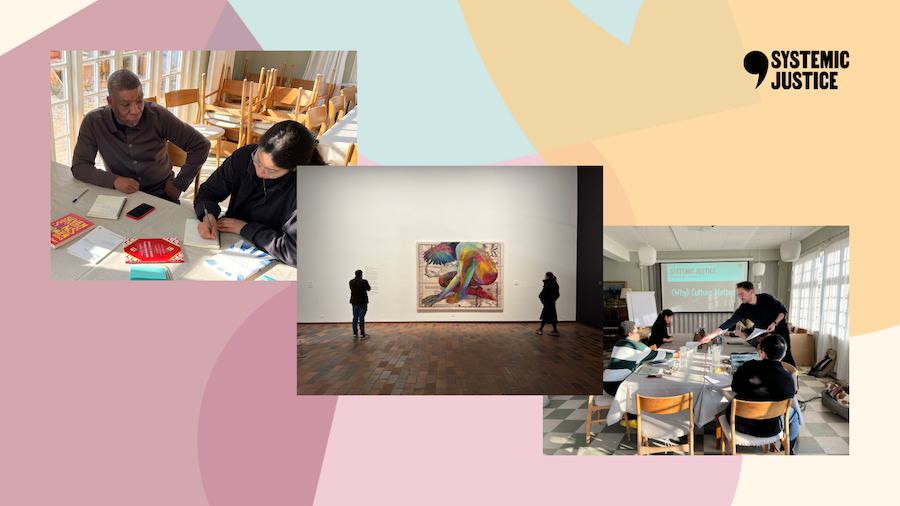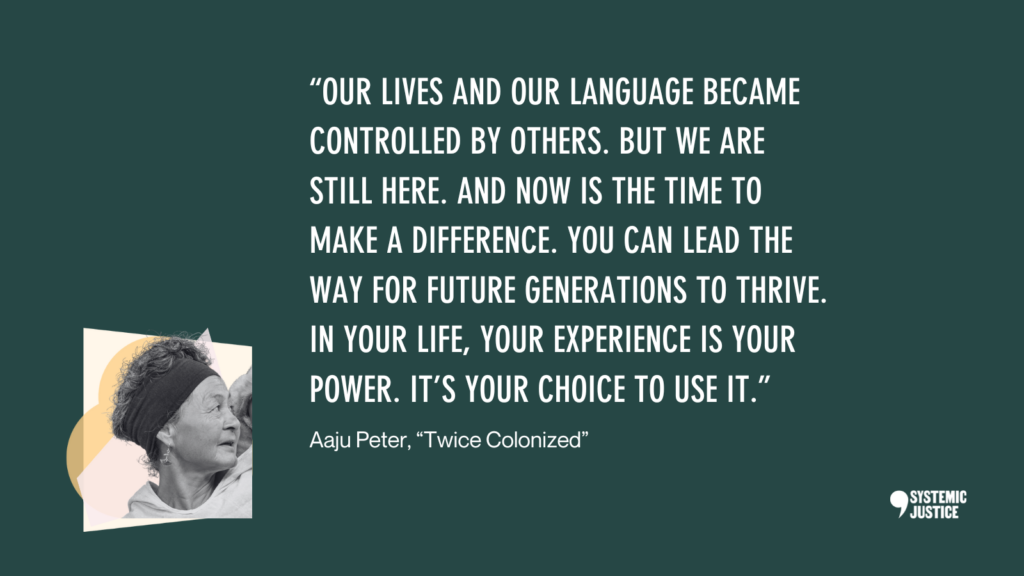“If you could change the way one system currently works, what would it be and why?”
This question, put to us at our recent team retreat by Lea Jovy-Ford from Mission Equality, asked us to imagine what the systems we live and work in would look like if they had not been built by colonialism and white supremacy.

Decolonising and unlearning have been a consistent theme since we started deep work on our organisational culture last summer. I have written previously about the challenges in operationalising our foundational values in practice, especially when it comes to each of us within the team taking responsibility for our own part in building the organisation we want. An important part of this is the guardianship framework we are building, setting clear guiding values and principles for what we do at the individual, collective, and systemic level to play our role in bringing about the change needed.
But before we can learn, we need to unlearn, and create space – in our lives, but most importantly in our own minds – to visualise what working in a different way looks like. This is not an easy feat: all aspirations notwithstanding, our current reality is one where we have to exist and try to do work in a system that is completely at odds with the worlds we are trying to build. We are used to operating in these systems both personally and professionally, and constantly run the risk of getting distracted from our mission because we are too busy dealing with systems of oppression. Breaking free from patterns we know, even if we don’t agree with them, is not easy. I sometimes feel this is especially challenging in fields that are embedded in age-old systems of hierarchy and privilege, such as the legal profession.
And yet. Once you start dreaming, you cannot help but get excited. In doing this exercise, we focused on climate justice and imagined a world that had not been built on violent colonial extraction. We saw a world where humans shape how they live around nature, rather than trying to submit nature to their will. We acknowledged that this vision would ultimately have implications for all matters and systems of life, including economics, governance, housing, and even family structures. Because we would live off the land sustainably, humanity would become more nomadic to make sure our different resource needs would be met without overexploiting the Earth. We imagined our family structures would need to change to accommodate this type of mobility, abandoning patriarchal nuclear models towards ones with community-centred care responsibilities. This would also mean doing away with land ownership and private property, and also other imperialist constructs such as borders and citizenship.
This one conversation on climate justice highlighted how all these different systems and constructs are connected, and it helped surface the change that is possible, too. If it’s all connected, what will happen across systems when we tip the first domino in one of them? Similarly, what are we able to do externally if we invest in our inner work?
Our visit to the exhibition “Trust memory over history” at Louisiana Museum in the middle of our team retreat could not have been better timed in this regard. Dominican-American artist Firelei Báez paints on top of ancient colonial maps and construction plans for colonial architecture. The images she imposes over these imprints of power include roots, plants, hair, water, and the mythical Dominican folkore creature of the Ciguapa: a figure that is presented in dominant, normative, colonial narratives as evasive, cunning, and a “wanton female figure”. Báez flips and reframes this narrative to centre the anti-imperial power at the root of the Ciguapa. As she has said, “the understory is they are highly independent, they’re self-possessed, and they feel deeply. So who would not want to be that?”
In a site-specific piece for the Louisiana Museum, Báez paints with acrylic and mica over a 1724 map of the west coast of Greenland. The year and map signifying the colonisation of the Inuit people by Denmark. The inter-generational harm of this is explored in the exceptional documentary film Twice Colonized, which we also watched during the retreat. This film documents the work of Inuk lawyer Aaju Peter, who has lived in both Greenland and Nunavut, in her fight for justice for the Inuit peoples. Like Báez, Peter’s work is deeply personal and seeks to challenge the dominant, colonial narratives that are obstacles to achieving justice, repair, healing, and liberation for her and her community. At the end of the film, she shares: “Our lives and our language became controlled by others. But we are still here. And now is the time to make a difference. You can lead the way for future generations to thrive. In your life, your experience is your power. It’s your choice to use it.”

To bring about the change we want to see, we need to do the inner work – personally and collectively as an organisation. This is why we are committed to unlearning and growing when it comes to the organisational culture at Systemic Justice. So, like the Ciguapa in Báez’s visions, we too can trample over the colonial maps and infrastructure lying at the root of the injustices people experience today.
